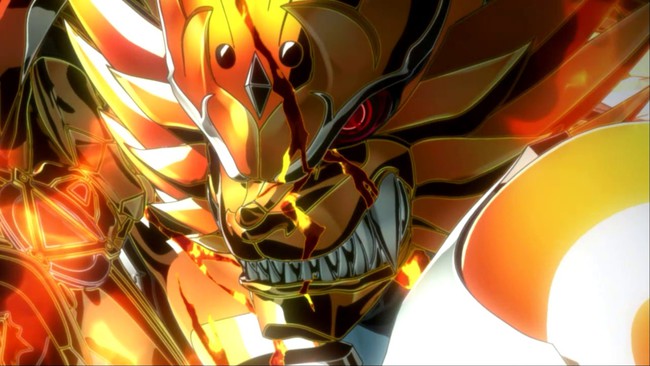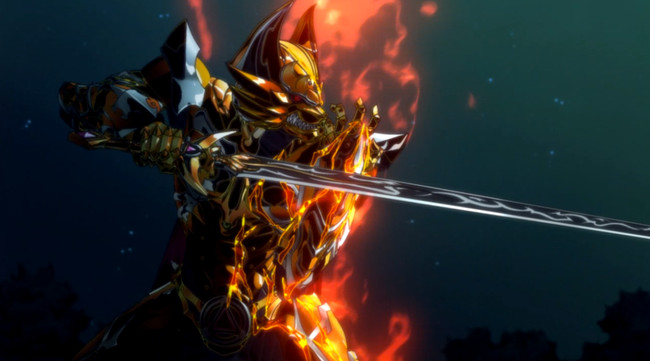Interview: GARO Producer Toru Kubo and Director Yuichiro Hayashi
by Gabriella Ekens,
The action-fantasy-drama anime GARO has an interesting genesis: it's the animated version of a live-action tokusatsu series that's undeniably for an adult audience. GARO the live-action series has spawned several sequels and has been running intermittently since 2005; the anime just completed its first season and is heading for a second. Select members of the cast and crew were on hand to promote the show and meet with fans at this year's Otakon; we had a chance to talk with the show's producer, Tōru Kubo, and the show's director, Yuichiro Hayashi.
ANN: To start, can you tell me about your respective duties as series director and producer?
Tōru Kubo: So, firstly, on a day to day on GARO, as an original story, there were many sides to it, like, say, the competition and storybook sides. As a producer, I had to run around and make sure it was all connected. I had to work with the audio, ask “what kind of opening are we going to make? What kind of ending? What kind of in-show BGMs? Are they all going to tie up? Mash up into one thing? But I personally think that producers are people who go around being fireman, taking care of fires that blaze up here and there, troubles that arise here and there, completely randomly. You go around being boss-like as a producer… “Minion.” That's probably the closest thing to it.
Yuichiro Hayashi: I personally take care of everything that happens on the spot. Say, it might be sound checking, picture content, and character art and whatnot. I might go around making things myself, or asking people to do things like artwork. After doing such things, we go through something called a “rush check” – basically crash checking of things that are done right now, watch completed videos, recordings. After that's done I take care of the audio stuff too. Lastly I go around putting everything together, putting last checks on everything to make sure that it's all okay.

ANN: Mr. Kubo said yesterday that he'd worked on tokusatsu in the past. Do you have any relationship to tokusatsu, Mr. Hayashi, either as a fan or a professional?
YH: This was personally my first time doing tokusatsu work. I'd actually never worked on tokusatsu before. But as a little boy I'd seen many tokusatsu alongside many anime. They were sort of the same thing for me. I'd even seen many works by Amemiya [GARO's creator]. So I would place myself on the fan side.
ANN: Do the same people who like tokusatsu also like anime?
YH: I personally think that tokusatsu and anime fans are different. There is a part that overlaps between them. But I think that tokusatsu is something that's more converging as one line. Everyone went through tokusatsu as a child. But there is a dividing line at a certain age whether they go this way or that way, and people who go into tokusatsu see just tokusatsu and nothing else – broadly speaking. That's one of the reasons I have to believe that the tokusatsu audience is very different culturally from anime fans in general.
ANN: Was making GARO – an anime based on a tokusatsu – an attempt to bridge that gap?
YH: Were we able to make a bridge? I'm not exactly sure. But I'm sure that became a stepping stone so that people who like anime were able to get into GARO, and maybe through GARO get enthused about tokusatsu. You certainly need that special something to get you started on that. I certainly think if GARO THE ANIMATION goes on, if we're able to make more series, we'll be able to introduce more people to tokusatsu. And generally speaking, there aren't that many tokusatsu-anime directors and producers out there, so I think that this will be interesting.
ANN: Mr. Hayashi, at the GARO conference yesterday, you said that you wanted to tell a story in the language of anime rather than tokusatsu, a “story without baggage.” How does anime tell stories differently than tokusatsu?
YH: I believe that the biggest different is how much is packed in. Tokusatsu uses actors. Relying on actors is relying on people, and people need that space to move around. So in tokusatsu lines and whatnot are not exactly set on stone, there's some space to move around, because they rely on actors. But in anime, we have the characters doing the acting, and that's different because those lines and everything are almost always set in stone – they're packed for density. There's a different density that goes into packing, into the movement area that goes into tokusatsu and anime.

ANN: What went into designing the various horrors?
TK: In terms of designing them, you notice that horrors are formed by “greed.” They each have a different “greed” that skews a person. That original “greed” is one aspect that we use to design them. In GARO, we call it “inga” like destiny. What would happen to this person if the “greed” kept building up on what was already there? Ultimately, the horrors are what we guess would happen to a person after all that “greed” of a certain type piles on.
YH: Since this is anime, it's not like tokusatsu where people have to be in those costumes. So Horrors, we try to give them inhuman shapes, very non-anthropomorphic, so we tried for many different shapes of Horrors. I myself am a big fan of those types of games, particularly horror games. So I kept asking, “how can we make them more scary? How can we make them more scary?”
ANN: Who are your favorite GARO characters?
YH: I love all the characters, but then I might have something special for Octavia. I love those evil types of characters, and I might have put some of myself into her.
TK: I can't really choose because I have so much love for all of the characters, but there are some characters who I notice my love for due to the voice actors. I'd say Germán is one of them.
discuss this in the forum (9 posts) |
this article has been modified since it was originally posted; see change history